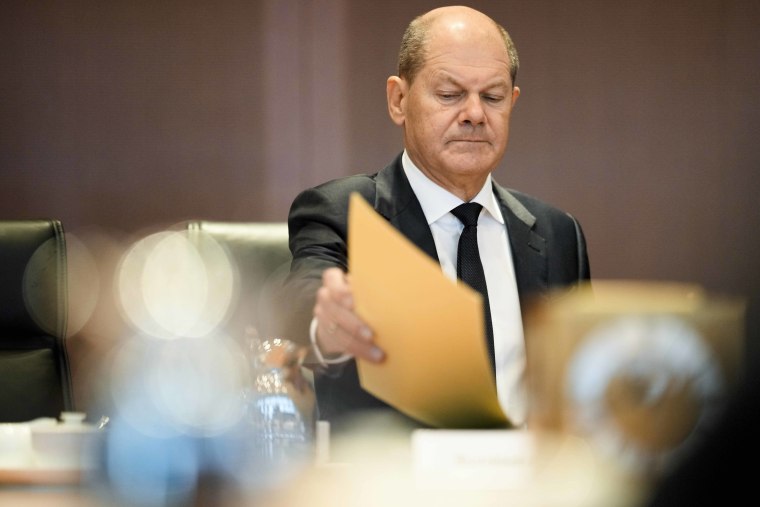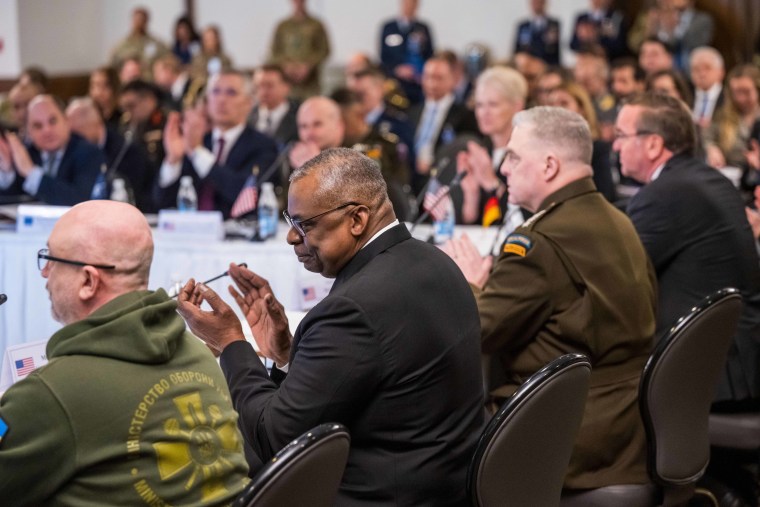[ad_1]
‘Free the leopards’
Germany has provided billions in humanitarian and military aid since the start of the war, but Scholz has broadly held to a cautious approach rooted in his country’s weighty history and political culture. That has sparked criticism from Ukraine, Poland and the Baltic nations, which have long urged a more robust response to combat Russia’s expansionist goals.
Thousands of protesters have gathered outside the Parliament in Berlin, while Ukraine’s government has promoted a social media campaign calling on Germany to “free the leopards.”
Ukrainian President Volodymyr Zelenskyy has been asking for increased firepower since before Russia’s invasion last February.
He and his advisers have made it clear that the hardware previously offered by the country’s allies would not be enough to recapture its territory, especially as both sides gear up for what many expect to be an intense period of crucial fighting once the winter is over.
“In order for us to defeat the Russian Federation, we absolutely need tanks,” Oleksiy Danilov, the secretary of the National Security and Defense Council of Ukraine, said in an interview last week.
Germany has more than 300 active Leopard tanks and more in storage. Poland has pledged to send a company of the tanks, typically 14, but has said the deployment would make more sense as part of an international brigade. Several countries use Leopard tanks, including Canada, the Netherlands and Sweden.
The United Kingdom has already pledged to send 14 Challenger 2 tanks to the Ukrainian front line.
The United States had been frustrated with Germany’s efforts to pressure Washington on the subject, three U.S. officials told NBC News last week, after Berlin signaled it would be more willing to provide tanks if Washington sent its own M1 Abrams tanks to Ukraine.

Deploying the tanks will be a gradual process.
Ukrainian troops need to be properly trained, while the tanks require parts for maintenance and are normally deployed alongside infantry units with their own procurement and training needs.
And despite the significance of Germany’s announcement, the effect on the direction of the war may be not just delayed but limited, one analyst said.
“The question is whether 100 tanks of different varieties will be enough to eject Russian forces from Ukraine. My bet is that it won’t,” said Matthew Ford, associate professor at the Swedish Defense University in Stockholm.
“With 300 there might be more chance of doing it, but you have to remember that Russia is doing the same thing [rearming and redeploying].”
Ford added that it was far from certain that any foreign tanks would be ready for combat ahead of an anticipated Russian spring offensive. The deployment of Leopard tanks was the most significant, he said, because of its conventional diesel-powered engine, as opposed to the jet-fuel-powered American Abrams tank.
“I still don’t think this war is over this year and it does not matter that tanks are being provided. It looks to me that the Russians are busily creating their own combat power, so we have another race of who can build up arms the quickest,” he said.

Russia has consistently warned that ever-increasing Western military supplies could cause a dangerous escalation between nuclear-armed powers.
Kremlin spokesman Dmitry Peskov described German and U.S. plans on tanks as a “a rather disastrous plan.”
“I am convinced that many specialists understand the absurdity of this idea,” Peskov told reporters Wednesday.
“Simply because of technological aspects, this is a rather disastrous plan. The main thing is, this is a completely obvious overestimation of the potential [the supply of tanks] would add to the armed forces of Ukraine. It is yet another fallacy, a rather profound one,” he added.
Earlier this month, Russian President Vladimir Putin replaced the commander leading his forces in Ukraine after months of battlefield setbacks and domestic criticism.
But Russia did claim its first victory in months on the eastern front lines of the war by taking the mining town of Soledar as part of its bloody campaign to seize the nearby city of Bakhmut — although it was unclear how much of the operation was carried out by the Russian military or mercenaries from the Wagner Group.
Ukraine finally confirmed Wednesday that its forces had withdrawn from Soledar, nearly two weeks after Moscow claimed victory there.
Associated Press contributed.
[ad_2]
Source link

